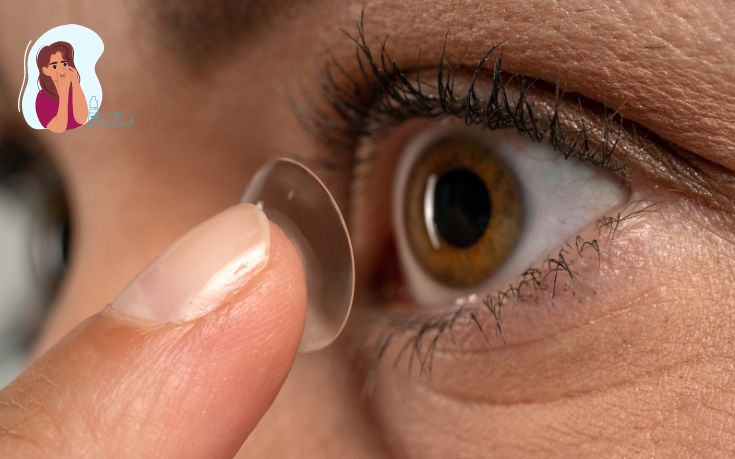Wearing contact lenses provides unhindered clear vision without having to wear glasses in your way of view. However, with this convenience comes great responsibility. The maintenance of cleanliness in contact lens hygiene is very important, as any infection poses a risk to your eye’s health. Being well-versed in the importance of hygiene in maintaining contact lenses, and how to maintain good hygiene will give you all the benefits associated with wearing contact lenses, minus the risks.
The most important prevention of infections related to contact lenses is hygiene. It starts with the way you handle your lenses. Wash your hands before you touch your lenses. Clean your hands well-using soap and water, drying them thoroughly with a clean and lint-free towel in order not to transfer bacteria or other foreign material to the lens. This basic step can significantly lower your risk of contamination.
Contact Lens Hygiene
Proper care of your contact lenses is very important for keeping your eyes healthy. Wash your hands well before touching them to avoid transferring germs into the eyes. Use contact lens solution, not water or, yuck, your spit.
Be sure to clean the case regularly, too. Do not sleep or swim in your contact lenses, because that will cause infections. And, most obviously, follow your eye doctor’s instructions with cleaning and checkups so that you will keep clear vision—and happy eyes!
Proper Cleaning and Storage of Lenses
Proper cleaning of contact lenses is an important part of lens hygiene. Clean, rinse, and store your contacts with the use of the solution prescribed for cleaning contact lenses. Do not ever use tap water because it may carry some harmful microorganisms. Rub the lenses with your fingers and gently rinse with the solution. This will help to keep your lenses clean and clear.
Storing your contact lenses properly is equally as important. Always use a clean case for storage, and replace it every three months to prevent the growth of bacteria. Every time you put your lenses in the case for storage, fill it with fresh solution; never reuse the old solution. Properly stored, the lenses will stay contaminant-free and ready to wear without a worry of safety.
Follow the Replacement Schedule
The relay replacement of your contact lenses, as prescribed, is very important. If the lenses are used for some time longer than prescribed, they can allow for protein deposits to form and significantly raise the risk of infections due to a reduction in the permeability of the lenses to oxygen. Be it a day, week, or month, replace it depending on the advisement of your eye care specialist to keep your eyes perfectly healthy.
Your lens case may have bacteria and other pathogens when you have been using it for a couple of months. Remember, just as with your regular case, you must also replace your lens case after three months of usage.
This will cut down on the chances of contamination and provide your lens with a clean environment while storing them away.
Do not Sleep with Your Lenses
Unless they are specifically designed for it, sleeping with your contacts in is dangerous. This greatly reduces the amount of oxygen reaching the cornea, most probably enhancing the risk of infections and other complications. Always remove your contact lenses before going to sleep so your eyes have a good rest with sufficient oxygen. If you accidentally fall asleep in them, remove them right away and follow proper cleaning routines.
Handle Lenses with Care
Do be careful with your contact lenses; you don’t want to scratch them, introduce contamination into them, or lose them. Do not touch your lens with your nails; they can tear or scratch your contacts. Be sure your fingernails are clean and short so that there may be no harm or accident. Also, try not to handle your contact lenses if you have just applied makeup or lotion on your hands.
When inserting or removing contact lenses, this should best be done over a suitably clean, flat surface, thereby reducing the chances of the lenses being dropped. If you drop a lens, then before reinserting it, rinse it thoroughly in more contact lens solution. This helps maintain the hygiene of your lenses.
Be Mindful of the Environment
The cleanliness of contact lenses could also be affected by environmental factors. Keep your lenses away from water—swimming pools, hot tubs, even the shower. Water may contain harmful germs that may stick to your lenses and put your eyes at risk for infection. If you have to be in water, maybe use goggles, or take your contact lenses out before being in the water, to help protect your eyes.
Be extremely careful in dusty or windy conditions because they may lead to debris getting stuck under the lenses and be painful. If it invades an open wound, it may cause an infection. Therefore, in such a scenario, you should put on some protective eyewear so as not to hurt your eyes or contaminate the lenses.
Regular Eye Check-Ups
Routine eye examinations are necessary so that your vision remains as healthy as it has always been, in particular, regarding the suitability of your contact lenses. Visit your eye practitioner annually to keep your vision healthy and to watch for any signs of infection or anything going wrong. Seek professional advice at the earliest if you experience discomfort, redness, or a vision change. Discuss your hygiene habits and the duration you have been using contacts with your eye care provider during your check-up. They can answer any questions you have and provide steps to help you ensure that your eyes stay healthy and safe.
Know the Symptoms of Infection
Familiarize yourself with the indications of a contact lens infection for timely intervention. Some of the typical symptoms are redness, painful sensations, excessive tearing, blurred vision, and sensitivity to light. If any of these symptoms appear, then urgently consult an eye care professional. Take your contact lenses off and make an appointment with your eye care professional. This timely step can prevent the infection from getting worse and save your vision.
Maintain Overall Health
In general, you should maintain the overall health of your eyes to wear your contact lenses safely.
Consume water, a balanced diet of vitamins and minerals, and have enough sleep. All these help with maintaining the health of your eyes and thus enhance your





